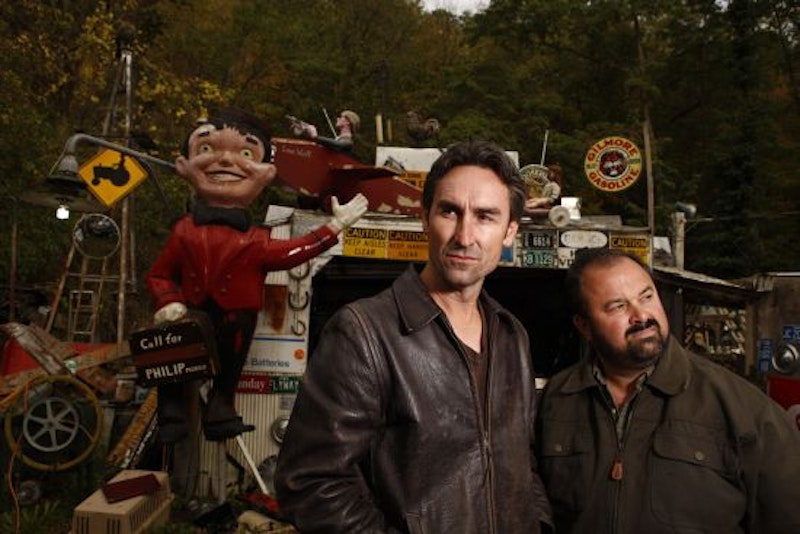I haven’t seen it etched in stone tablets, but there’s a tradition of uncertain provenance in the Round Rock, Texas development where I live with my family: before the sun comes up, open your garage. And it isn’t that everyone parks in their garages: from what I’ve gathered while taking the dog for early-morning constitutionals, garages are a repository for stuff. Sleeping bags, soda cartons, lawn chairs, quarts of oil, tricycles, bags of dog food—all the contrivances and essentials that are needed, but can’t be kept in the main house. And my neighbors insist on showing it off to total strangers, often all day long. It’s an invitation, essentially, to spy from a slight remove.
American Pickers (History Channel) takes this idea a couple of steps further. It’s a reality program about inviting amiable strangers into your home and encouraging them to rummage through, examine, and bid on the crap you’ve got lying around. If you can picture a cross between Hoarders and Pawn Stars—minus Chumlee-like dopes and staged, uncomfortable interventions—you’re most of the way there.
The Pickers are Mike Wolfe and Frank Fritz, old buddies who run a business called Antique Archaeology; the show follows them as they crisscross the country in a van, chasing tips from assistant Danielle Colby-Cushman. Wolfe is the pair’s taller half, with a narrow head, beady eyes, a smile crammed with teeth; he’s intensely voluble, a sort of friendly vulture. Fritz is warier, quieter, suggesting a patient warthog. They’re hunters. Their prey? “Picks,” where some eccentric hobbyist or obsessive collector has amassed a slapdash cache or fastidiously curated collection of knick-knacks, gumball machines, automotive parts, or other items that the conventional wisdom would consider functionless.
Houses and garages can be pick sites, but more often than not we watch Wolfe and Fritz rummaging gingerly through outbuildings, sheds, and barns full of dubious swag covered in layers of dust and dirt. Most people have encountered cluttered spaces like this—maybe a relative’s workshop, or on the property of a family friend—but etiquette or fear of injury typically prohibit keep us at bay. With permission and owners looking on, the Pickers unearth history, revealing today’s busted, rusted, or otherwise damaged junk as a link to bygone yesterdays. That skeleton of a bicycle is a classic, made overseas in the 1920s; those shiny virgin Harley-Davidson parts date back to the 40s; these earthenware pots are 18th century showpieces that belong in a museum, not somebody’s fire-hazard attic.
Half the fun of watching Pickers lies in the vicarious experience of watching grown men go completely apeshit in cramped spaces; fondling and drooling over figurines, ancient gas pumps, or antique Pepsi signs, they’re like kids run amok. Eyeing potential prices, they spit out offers to the owners, and a loose bargaining waltz begins: “How about $20 for this cigarette machine?” “What say $30?” “Let’s call it $25.” Then buyer and seller share a chuckle and a handshake. Wolfe and Fritz usually drive away with hundreds of dollars worth of merchandise that they can peddle to collectors for two or three times what they paid, always in cash—or stash in their private collections. Pickers sidesteps the icky, customer-is-always-robbed vibe of Pawn Stars because the stakes are lower, and both sides establish a just-folks camaraderie, a bonhomie based on a shared fetishism for junk. Everyone comes out ahead, but they’re all in it as much for the stories as for the money: how the World War II battlefield mementos found their way to a basement, why hundreds of vintage theatre signs are massed in one area, what a father and son in the rural south are doing with shelves and shelves of plastic, mass-produced crap acquired at yard sales. Pickers reaffirms the notion that we can’t take our belongings with us, that no object is sacred. How can it be, we wonder, that a man in his twilight years can talk a sentimental blue streak about things he’s owned for decades, only to turn around a minute later and let them go for a song? The answer? Memories ultimately carry more weight than stuff.
Please, take my junk
The cultural significance of that box of stuff crammed in the crawlspace.

